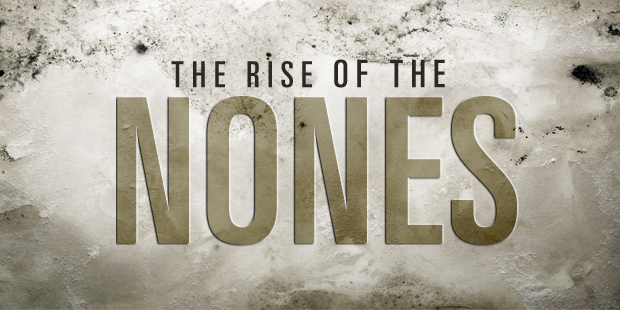The recent round-table discussion sponsored by the Pew Research Religion & Public Life Project on trends in religious research (transcript) focused most of its attention on the so-called "nones," a new religious category that includes those who state on sociological surveys that they are atheists, agnostics, or otherwise "not religious." The number of "nones" has been growing, and it is clear from the discussion among the participants in the round-table that it is not exactly clear why. It appears from the available data that what is actually happening is that people who never were involved in institutional religion used to mask that fact for researchers, but now they are more willing to state openly that they are "nones". The absolute number of the religiously uninvolved as a percentage of the population has not risen much if at all. The number who say they are uninvolved on questionnaires has risen.
Assuming that is really what is going on, the question is why? One intriguing possibility is that the rise of the religious right may have something to do with the willingness of the religiously uninvolved to be more open about their lack of involvement. The religious right has become a loud voice in American public discourse and appears more-and-more to be the dominant face of institutional religion. The "nones" are put off by the right and thus more willing to say so publicly—or so the theory goes. It is indisputable that the "nones" are generally more liberal than the over all population and many of them are Democrats, although apparently many do not vote and are as politically uninvolved as religiously. There may be a connection. That's the point of this thesis. Given the hard-right drift in both politics and religion, the "nones" may be drop-outs from both who are now inclined to say publicly that they are drop-outs.
The religious right generally is all about absolute boundaries between right and wrong, belief and unbelief. The "nones," so this thesis goes, accept the boundaries laid down by the right but self-consciously declare themselves to be on the other side of the line. There is a paradox here. The right wants to evangelize unbelievers and bring them back across the line and into the fold. The way they go about their evangelizing, however, actually makes it more difficult for the "unbelievers" to convert because those unbelievers find the right-wing dualism of the religious right objectionable.
It has to be emphasized that this thesis is not proven. From a progressive Christian perspective, however, it makes some sense. We also find right-wing ideological dualism disturbing and would only want to say to the "nones" that there are other ways to think about faith and God beside those that dominant our public discourse today.
